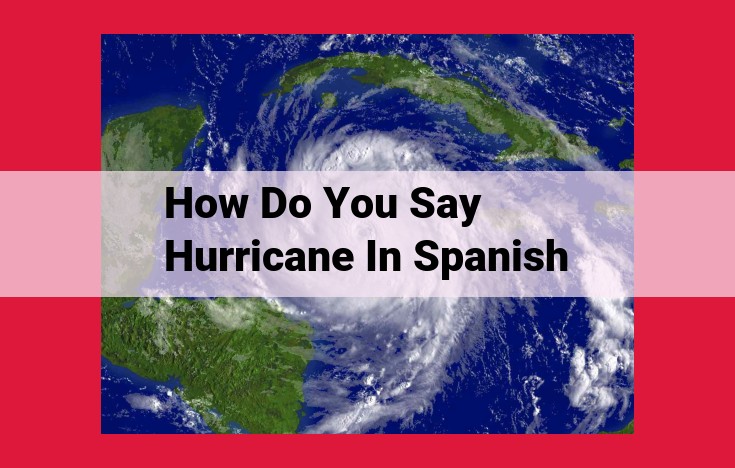The Spanish term for “hurricane” is “huracán,” a word of Taino (indigenous Caribbean) origin. This term aptly captures the immense power and destructive force of these tropical cyclones, often characterized by strong winds, heavy rainfall, and coastal flooding. Understanding the Spanish nomenclature for hurricanes is crucial, especially in Spanish-speaking regions frequently affected by these natural disasters.
Hurricanes: Unraveling the Destructive Forces of Nature
In the vast tapestry of meteorological phenomena, hurricanes stand as colossal forces that command awe and inspire dread. These swirling behemoths of the ocean possess the power to unleash unparalleled destruction, leaving a trail of devastation in their wake.
Characterized by their eye, a region of eerie calm surrounded by a wall of towering thunderstorms, hurricanes are born from the warm, moist air over tropical waters. As they gather momentum, they spiral inward, fueled by the rising air currents and the release of prodigious amounts of energy.
The destructive capabilities of hurricanes are truly staggering. Their high winds can reach speeds exceeding 150 miles per hour, tearing through buildings, uprooting trees, and snapping power lines like twigs. Torrential rains accompany these winds, leading to devastating flooding, which can turn once-familiar landscapes into raging rivers. Storm surges, massive walls of water pushed ashore by the hurricane’s force, can inundate coastal areas, causing widespread destruction and loss of life.
Hurricanes are not mere meteorological curiosities; they pose a significant threat to human societies. They disrupt lives, damage infrastructure, and cripple economies. Understanding these powerful storms and taking appropriate precautions is crucial for minimizing their devastating impacts.
The Spanish Word for “Hurricane” and Its Significance
Hurricanes: A force of nature that has the power to devastate coastal communities, leaving behind a trail of destruction and loss. The word “hurricane” itself has a rich history, tracing its roots to the indigenous peoples of the Caribbean.
The Taíno Word: The Taíno people, who inhabited the Caribbean islands before the arrival of Europeans, had a word for these powerful storms: “huracán.” This word is believed to have originated from the Taíno deity *Huracan, who was said to be the god of storms and thunder.
Adoption by Spanish Colonizers: When Spanish explorers and colonists arrived in the Caribbean, they adopted the Taíno word “huracán” to describe the fierce storms they encountered. The Spanish language eventually spread throughout the Americas, carrying the word “huracán” with it.
Today’s Usage: The Spanish word for “hurricane,” huracán, is still widely used today in Spanish-speaking countries around the world. It is a testament to the enduring legacy of the Taíno people and the profound impact that hurricanes have had on the Americas throughout history.
Entities Related to Hurricanes
Synonyms
- Cyclone: Used in the Eastern Hemisphere for storms with similar characteristics.
- Typhoon: The term for hurricanes in the Northwest Pacific.
- Willy-Willy: A colloquial term for a hurricane in Australia.
- Twister: A rotating column of air that can accompany a hurricane.
Related Terms
- Tropical Storm: A weaker form of a hurricane with wind speeds below 74 mph.
- Hurricane Force Winds: Sustained winds of 74 mph or higher.
- Squall: A brief, intense gust of wind associated with a storm.
- Storm Surge: A rise in sea level caused by a hurricane that can cause significant flooding.
- Eye: The calm center of a hurricane.
Organizations and Agencies
- National Hurricane Center (NHC): Monitors and forecasts hurricanes in the Atlantic and Eastern Pacific basins.
- National Weather Service (NWS): Issues hurricane warnings and provides updates on hurricane activity.
- Federal Emergency Management Agency (FEMA): Coordinates disaster relief efforts in the United States.
- World Meteorological Organization (WMO): Collaborates internationally on hurricane forecasting and research.
Regions Affected by Hurricanes
- Atlantic Basin: Hurricanes form off the coast of Africa and move westward toward the Americas.
- Eastern Pacific Basin: Hurricanes form off the coast of Mexico and move northward along the West Coast of the United States.
- Northwest Pacific Basin: Hurricanes form off the coast of Southeast Asia and move westward toward Japan and China.
Precautions and Preparation
- Monitor hurricane forecasts: Stay informed about approaching storms.
- Secure homes: Board up windows, fasten loose objects, and reinforce roofs.
- Evacuate: Follow evacuation orders from local authorities if necessary.
- Stock up: Gather essential supplies such as food, water, medication, and first aid kits.
- Plan: Develop an emergency plan that includes evacuation routes, meeting points, and contact information.
Socioeconomic Impact
- Property Damage: Hurricanes can cause extensive damage to homes, businesses, and infrastructure.
- Economic Losses: Disruptions to transportation, tourism, and other industries can lead to significant economic losses.
- Human Suffering: Hurricanes can cause injuries, displacement, and even death.
- Environmental Damage: Hurricanes can erode beaches, damage coastal ecosystems, and contribute to climate change.
